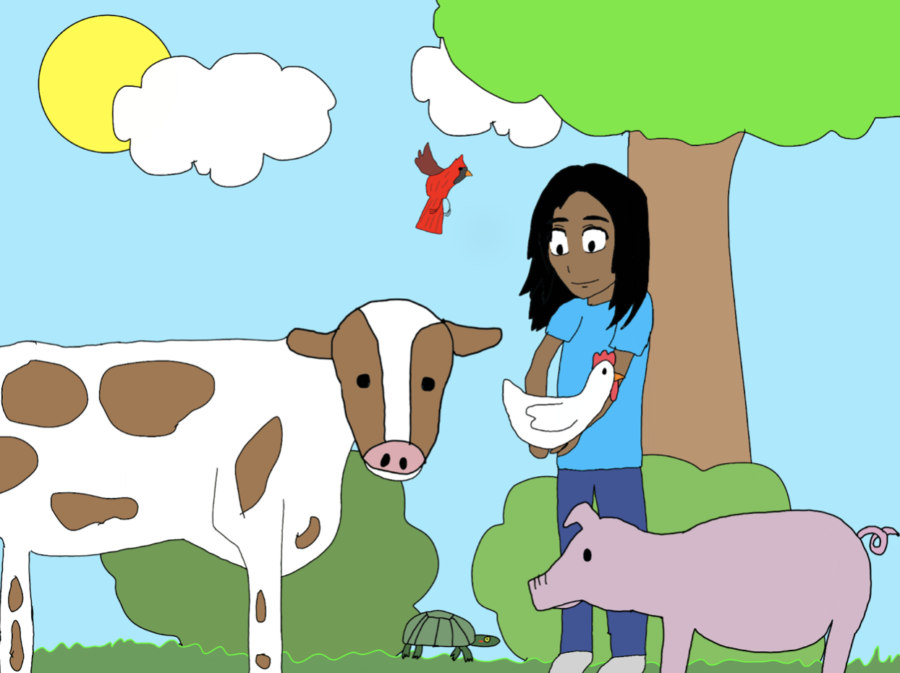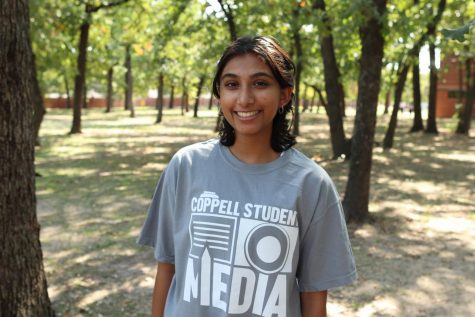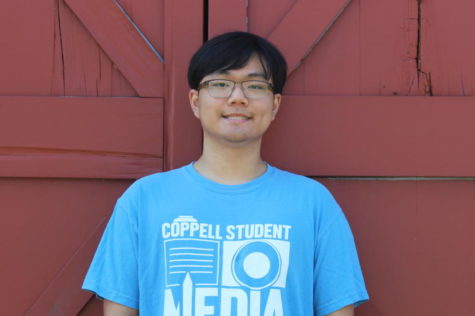Vegans living in a world of meat eaters
Coppell High School junior Sapna Amin explains her vegan diet and conveys the perspective of the animals commonly consumed for meat. Over recent years, veganism has become a more popular diet.
November 13, 2019
The lifecycle of farm animals begins with their birth; after they have grown strong, they are used as labor, and the animals are then worked until they become weak.
Finally, they are slaughtered and end up on your plate.
The entire life of a farm animal, from the moment it is born until after its death, is centered around humans. It did not choose this life, though I would hardly call this living.
All living beings should be considered equal. Most people tend to value the lives of humans over animals. Due to them being the primary protein source for so many people, these animals are a valuable part of our lives. However, we still tend to take them for granted.
“I respect [vegans and vegetarians] for cherishing animals’ lives and not killing them. They must have a lot of discipline to be around people who eat meat,” Coppell High School sophomore meat-eater Edward Kim said.
Most people never recognize everything animals do for them and just consume their meat and byproducts without another thought. Even I was guilty of this before I became vegan. I hardly thought about the sacrifice animals make for humans in order for us to survive.
I chose to be vegan after becoming more educated about how the animals are treated. I wanted to make a difference in the environment and cutting out meat and byproducts from my diet allows me to do so. Every living being’s life matters and I could not get over the fact that we are taking from them without giving anything back.
The difference between a vegan and a vegetarian is vegans can not consume anything that comes from animals, including their byproducts. This would be things such as eggs or milk. Vegans also create even less of a carbon footprint. It really just depends on your preferences.
These animals are forced to evolve and adapt into domestication. Looking back, this is morally questionable. These animals have learned to live off food and resources constantly provided for them so it is highly unlikely that they could provide for themselves if they were put back into their natural habitat. The increase in urbanization has also caused their natural environments to diminish.
“I decided to become vegetarian not only for health reasons but also for environmental reasons. I wanted to do my part. I feel a lot healthier and more energized,” CHS senior vegetarian Natalie Howitt said.
Mother Nature provides us with every resource we need to survive such as fruit, vegetables and grains. People tend to take our Earth for granted by throwing trash everywhere, cutting down trees, as well as so many other awful things.
I understand that people can not financially become vegan. A possibility could be slowly transitioning into the lifestyle. Once you get more and more used to it you could see the benefits and make adjustments to your budget and prioritize your spending if you decide you would like to become vegan.
“The agriculture industry is one of the worst producers of (carbon dioxide),” CHS senior vegan Amrin Haque said. “When land is cleared of vegetation to create new space for farming, the dead plants are either burned or left to decay. This process emits carbon dioxide, a greenhouse gas, into the air, which contributes to global warming.
It is unfair for humans to consume other animal’s meats and byproducts without giving anything back. The reason we are more powerful compared to other animals is because we take everything by force. We take eggs from chickens, milk from cows and different furs from animals, but we hardly ever give anything back.
Currently, there are many protein substitutes that offer similar nutritional value as traditional sources of protein.
“I use tofu and many [milks made from nuts]… my diet also consists of a lot of vegetables,” Haque said.
The amount of abundant substitutes make it easier to gain access to a substantial amount of protein in a healthy diet.
However, the transition to a meatless diet may prove to be difficult if you have been regularly incorporating different types of meats into your diet.
“When I first started [being vegan], [eating meat] was tempting because I had been eating meat my whole life but when you are in the right mindset, it’s easy to avoid the temptation,” Haque said.
Everything humans provide for farm animals helps us in the long run. People provide resources for the animals in order for them to be strong and live long lives so in turn, the animals are able to do as much work as they can for as long as they can. After the animals are no longer helpful on the farm, they are killed for their meat.
“People should be vegan so we can lower the amount of animal cruelty that occurs in the industry. Nothing is going to change if there is continuous mass production of animal meat and their byproducts,” Haque said.
The animal industry does everything in order to create the most profit. The mass production is a representation of its high demands. The industry provides the minimal amount of money for the animals’ food and shelter because they want to make as much money as they possibly can.
Since such a large portion of our economy is dependent on the animal industry if more people became vegan the gap could be filled with focusing on less cruel industries. For example, this would allow us to rely more on our agriculture industry and allow it to flourish.
For me, being vegan is a peaceful protest because I can not control the choices others make. I want to do everything I can to help Mother Earth. I feel that by being vegan I am making a difference in my world.
Follow Sapna Amin(@sapnaamin6) and @CHSCampusNews on Twitter.











